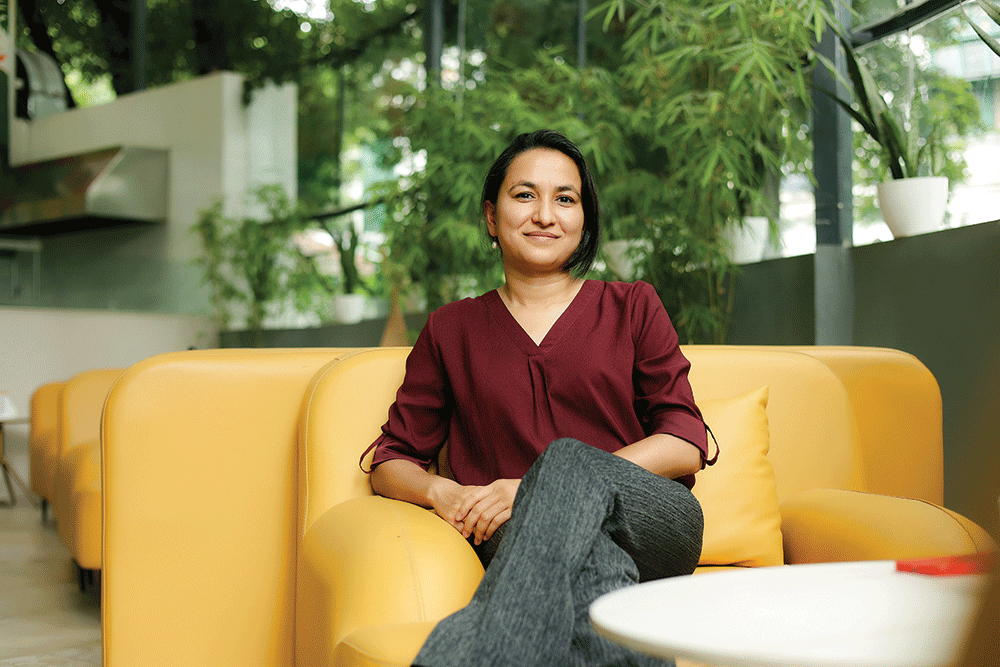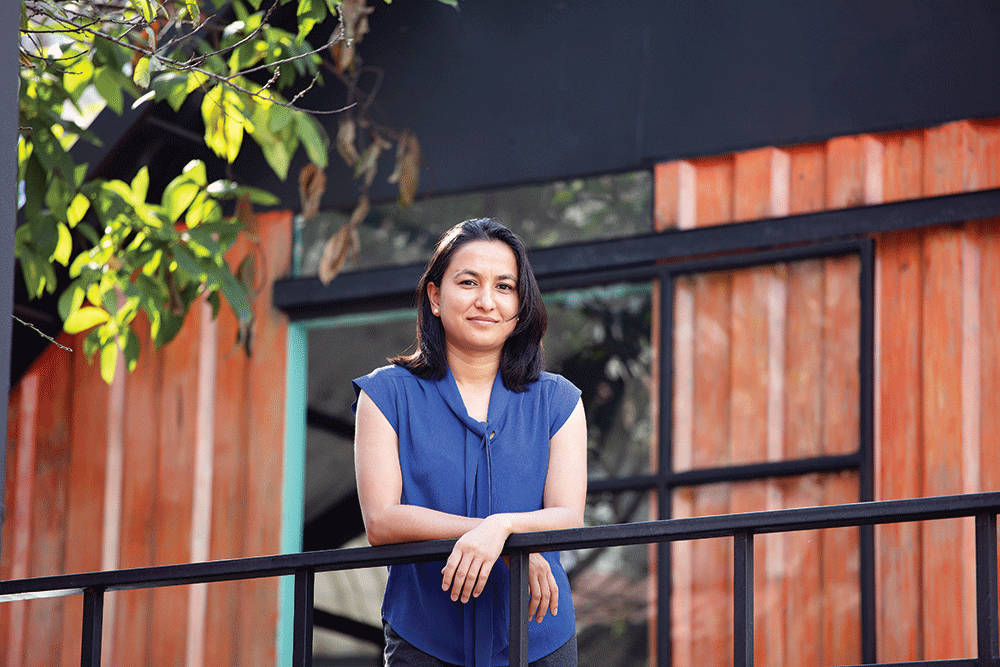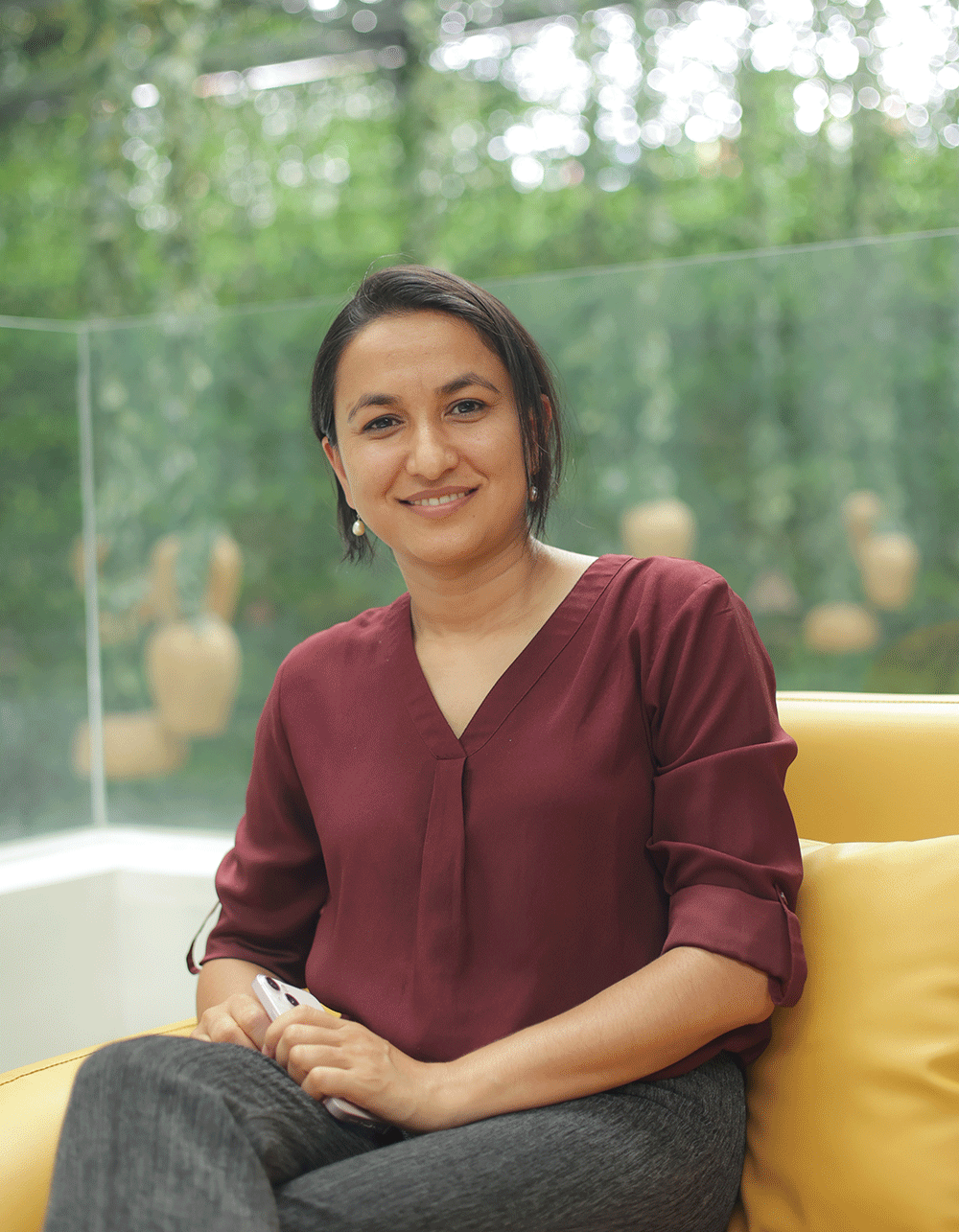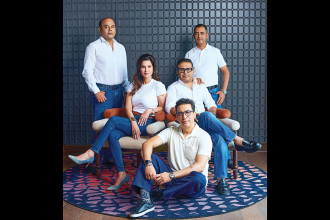
JYOTI PANDEY
SAMAANTA FOUNDATION
-
So much of human life is about giving, receiving and repaying, the act of paying it forward can impact, can inspire and transform lives.

Going back to when she initially joined Budhanilkantha School, she recalls that she didn’t have much clue on what was going on in the class. “Coming from a government school in a village to Kathmandu where all the subjects were taught in English was very difficult and it took me quite some time to adjust,” she says. “However, it is all about persevering to best utilise the opportunity one gets in life.” Pandey explains that Samaanta just does not provide a scholarship, it is actually a fellowship. “We take care of the accommodation needs of the students we select and also provide training in English and computer skills besides mentorship and leadership training,” she elaborates. The foundation also supports the students with uniforms and though the fellowship is for grade 11 and 12, if a student is exceptional then support is provided for the Bachelor’s degree studies too. At present, the foundation has students from 11 districts across the country. The students are also encouraged to interact and learn from each other. She says, “I too have gone through that phase in life, a little girl from a small village coming to the capital and having to stay with individuals from various other regions so I know how important it is to learn from one another.” Pandey says the foundation selects a few public schools and asks them to nominate students every year. The candidates then have to go through a written examination and interview before they are finally chosen for the fellowship. “This year we received over a hundred applications and we selected 15 students and it is during this final selection that we have a lot of discussions and arguments among team members,” she shares. Pandey says these discussions are very important because they need to ensure they have chosen the most deserving candidates. “That’s one reason why I feel a team where all members understand and work towards the organisation’s vision is so important,” she emphasises. Though the team members make personal financial contributions, it would not be possible to run the programme just on personal funding. Pandey says that they also raise money from within and outside the country. “A lot of funding has come from friends and family who believe in our mission and we do have a few institutional donors too,” she shares. One of the major contributors she mentions is an NGO called Foundation Care For All which is based in the Netherlands and has been supporting educational initiatives in Nepal. The foundation also receives support from a partner in London and an Australian mortgage company called Home Loan Experts that has its backend offices in Nepal.“Samaanta is fundamentally about developing changemakers in the society and the medium to achieve that is by providing an opportunity for quality education to those in need”
 Fund raising is always a challenge. “I wouldn’t say that Nepali business houses are not into philanthropy, in fact it is a legal requirement now and it has been increasing,” shares Pandey, “But the focus in Nepal has been more on visible types of contributions where you organise a health camp and provide free treatment to around 200 people.” What Samaanta does is totally different and the programme is expensive by design, she shares, adding that for a high school student, the cost is around Rs two lakhs every year. “While it may seem expensive to invest in one person but our work has shown it is a worthwhile investment and the comprehensive nature of our support is meaningful,” she states.
Pandey encourages business leaders to look at their work and the long-reaching impact of what Samaanta Foundation does. “Our belief is that people with potential if provided the opportunity will go on to become changemakers, so investing and providing all the support that a student needs particularly in education is the need of the hour,” she says.
She also says, “It is not that someone gives a certain sum of money and that’s the end of it; we involve them in the process. We partner with anybody interested in supporting us if they believe in our mission. Remember, it’s not just about handing over a sum of money to us or the students, it’s about participating in the change.”
After a decade of involvement in the education sector of the country through Samaanta Foundation, Pandey says that although they are a small organisation and she is not exactly an authority on how the education sector has evolved over the years, "however, there are several structural weaknesses in the system. There are large government programmes attempting to reform the education sector but more could be done. We have also realised that students have very limited critical thinking skills and this is one aspect which needs to be looked into. I think our education system does not teach what we need as young adults entering the labour market."
What students learn at school is basically limited to what is in the textbooks and often memorising is encouraged,” she shares. Pandey believes that what we expect students to learn and what we want them to learn has to change. “And that change can come about partly from curriculum and partly from how we train the teachers to teach in class.”
The reason she is passionate about education is due to the fact that proper education will lead to empowerment and further to an equitable society. “That is the theory of change we are working with and empowerment means both financial and social,” she says. “When individuals are empowered, subsequently a community gets empowered and that is why proper education is so important,” she emphasises.
The other social aspect she is keen to change is of parents still showing more interest in investing in the male child rather than the girl child. “Though there have been remarkable changes, access to education for girls in Nepal is still comparatively low.”
Though Samaanta is team driven, Pandey is a core and critical member of the foundation leading its programmes. She says that the fellows who have been associated with the foundation have been mentored to take on leadership roles as well. This, she says, instils a sense of responsibility among the students. “Samaanta is fundamentally about developing changemakers in the society and the medium to achieve that is by providing an opportunity for quality education to those in need,” signs off Pandey.
READ ALSO:
Fund raising is always a challenge. “I wouldn’t say that Nepali business houses are not into philanthropy, in fact it is a legal requirement now and it has been increasing,” shares Pandey, “But the focus in Nepal has been more on visible types of contributions where you organise a health camp and provide free treatment to around 200 people.” What Samaanta does is totally different and the programme is expensive by design, she shares, adding that for a high school student, the cost is around Rs two lakhs every year. “While it may seem expensive to invest in one person but our work has shown it is a worthwhile investment and the comprehensive nature of our support is meaningful,” she states.
Pandey encourages business leaders to look at their work and the long-reaching impact of what Samaanta Foundation does. “Our belief is that people with potential if provided the opportunity will go on to become changemakers, so investing and providing all the support that a student needs particularly in education is the need of the hour,” she says.
She also says, “It is not that someone gives a certain sum of money and that’s the end of it; we involve them in the process. We partner with anybody interested in supporting us if they believe in our mission. Remember, it’s not just about handing over a sum of money to us or the students, it’s about participating in the change.”
After a decade of involvement in the education sector of the country through Samaanta Foundation, Pandey says that although they are a small organisation and she is not exactly an authority on how the education sector has evolved over the years, "however, there are several structural weaknesses in the system. There are large government programmes attempting to reform the education sector but more could be done. We have also realised that students have very limited critical thinking skills and this is one aspect which needs to be looked into. I think our education system does not teach what we need as young adults entering the labour market."
What students learn at school is basically limited to what is in the textbooks and often memorising is encouraged,” she shares. Pandey believes that what we expect students to learn and what we want them to learn has to change. “And that change can come about partly from curriculum and partly from how we train the teachers to teach in class.”
The reason she is passionate about education is due to the fact that proper education will lead to empowerment and further to an equitable society. “That is the theory of change we are working with and empowerment means both financial and social,” she says. “When individuals are empowered, subsequently a community gets empowered and that is why proper education is so important,” she emphasises.
The other social aspect she is keen to change is of parents still showing more interest in investing in the male child rather than the girl child. “Though there have been remarkable changes, access to education for girls in Nepal is still comparatively low.”
Though Samaanta is team driven, Pandey is a core and critical member of the foundation leading its programmes. She says that the fellows who have been associated with the foundation have been mentored to take on leadership roles as well. This, she says, instils a sense of responsibility among the students. “Samaanta is fundamentally about developing changemakers in the society and the medium to achieve that is by providing an opportunity for quality education to those in need,” signs off Pandey.
READ ALSO:
Published Date: November 8, 2022, 12:00 am
Post Comments
E-Magazine
RELATED In the Lead



-1749018895.jpg)